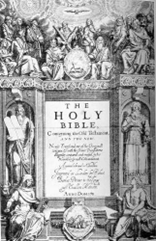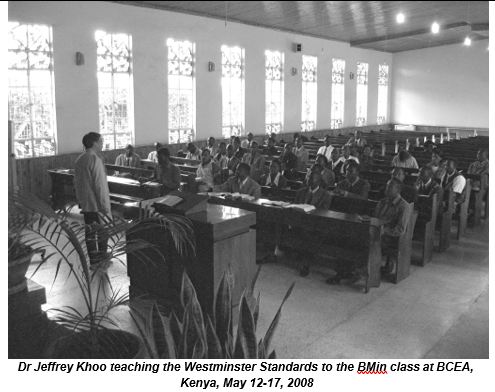Textual Reception or Textual Criticism?
(Testimonies from students who took the DVBC course on “The Bible Stands” at FEBC from April 28 to May 3, 2008)
 I am thankful to God for being gracious to me for I, being a young believer and without proper guidance on the doctrine of Verbal Plenary Preservation, was stumbled by the vast differences modern Bible versions share, and disturbed by the disharmony between different versions on the same Bible passage and the many instances whereby scission of God’s Word was done, and was left with the question on which truly is the Word of God, and how would one know. By the grace of God, He brought me out of confusion and vexation when He led me to learn of the source of the problem which lies in the types of manuscripts used for the translation of the different Bible versions.
I am thankful to God for being gracious to me for I, being a young believer and without proper guidance on the doctrine of Verbal Plenary Preservation, was stumbled by the vast differences modern Bible versions share, and disturbed by the disharmony between different versions on the same Bible passage and the many instances whereby scission of God’s Word was done, and was left with the question on which truly is the Word of God, and how would one know. By the grace of God, He brought me out of confusion and vexation when He led me to learn of the source of the problem which lies in the types of manuscripts used for the translation of the different Bible versions.
Reviewing the course, I am filled with awe and gratitude to my Almighty God who not only has inspired His words in the original autographs but has also by His singular care and providence kept them pure in all ages in the faithfully copied apographs. I am, at the same time, also filled with great indignation for Westcott and Hort and the editors of the Critical Text, who have taken God’s Word lightly and without due reverence, and in employing their humanistic textual criticism to God’s sacred Word, like they would for any other literature, giving rise to the modern versions based on corrupt Alexandrian manuscripts that seek to cast doubt on God’s Word, scissor out God’s Word and attack the vital doctrines of the Christian Faith. LCH
Having gone through the course, I am even more convinced of the VPP stand, without which a floodgate of unthinkable errors would just swarm over us. No one can stop such a deluge without the perfect Word of God. The logic of faith based upon the Word of God is the best safeguard against such a catastrophe. It is a tragic thing that anti-VPP Christians just choose to ignore what is clearly taught in the Bible concerning the perfect preservation of God’s Word (Matt 5:18). They rather follow human reason to deal with the issue of preservation and end up with lots of loopholes for the enemy to attack. What an embarrassing and pathetic situation! I am very happy that VPP advocates do not isolate themselves but are able to accept others who do not think that the Bible has any errors. It is also important for us to distance ourselves from Westcott and Hort and to reject textual criticism which basically puts man above God in determining the words of God. WCL
I count it a great blessing to have this opportunity to spend this week on the in-depth study of the Bible issue, with a focus on the examination of the fallacious practice of textual criticism, against the God-honouring method of textual reception. Much literature continues to be written in attack of VPP by both leaders and lay-persons, articulating their ire at the apparent ‘trouble’ that VPP has caused and how seemingly ‘heretical’ it is. Such continual onslaught can be wearisome, discouraging and frustrating. It is therefore with much joy that I sat through the lectures and reviewed once again the various arguments and perspectives of the whole textual debate. I particularly enjoyed the interaction with the various authors of varying perspectives, like that of Dan Wallace, Bart Ehrman, Edward Hills and others. Fundamentalism’s Folly by Peter Van Kleeck was also a rather refreshing read, for he brought to light many authors and theologians of old who in the past also spoke clearly of the doctrine of Bible preservation, clearly proving that it is not a new doctrine, but one held dearly to by fundamentalists in the past as well. Of much instructional value and encouragement (and also entertainment!) was Dr Dell Johnson’s clear and passionate defence of the KJV and preservation. KLK
When I was exposed to the Bible issue and debate, I thought it was something minor and there was nothing to worry about. This is because from the beginning I took for granted with a childlike faith that nobody would dare to criticise the Bible. As time went on I came to realise that it was no small matter. I came to realise that those who hold on to a conservative, fundamentalist understanding of the Bible would one day deny the perfection of the Bible. Not only that but I have witnessed through this course how academic scholarship and pride may turn one’s simple faith of believing on the Bible to a complicated and unattainable approach of trying to ascertain the words of God by what is called “textual criticism.” This was well exemplified by Bart Ehrman who once professed to be a believer, but ended up being “agnostic.” This is a warning to me how I ought to submit to the authority of the Bible and not the ideas of men. JPK
Ehrman’s testimony is a frightening one. How one man is able to fall from a conservative evangelical background into the dark pits of agnosticism, is morbidly fascinating. It is almost a classic case of how someone from even a rather sound, evangelical background, from Moody Bible Institute, can fall into the depths of such despair. One lesson learnt is to preach the true gospel. Apparently in his case, it does not seem that he has been saved, and perhaps, this “born again” experience that he barely defines, seems to be more of an experience, then actual conversion within. The human tendency to use our corrupted logic can only result in a downward spiral if it is not saved by faith and the guidance of the Spirit. JT
It is enlightening to read and study the testimony of Bart D Ehrman as he testifies with all honesty how a weak foundation in the biblical doctrines of inspiration and preservation can lead one to deny the faith. I thank the Lord for the 8 principles of identifying the preserved text of Scripture. I thank the Lord for the video on Dr Dell Johnson’s defence of the KJV and the Traditional Text. Also, the quotation of Francis Turretin’s Systematic Theology was most enlightening, showing that before Warfield’s time, conservative Christians held to the view of the infallibility and inerrancy of the apographs and not autographs which we do not have today. The statement by the Trinitarian Bible Society was also important, “Therefore these texts [i.e. Hebrew Masoretic Text and Greek Textus Receptus] are definitive and the final point of reference in all the Society’s work.” It is the same approach that I learned in FEBC Greek classes in reading and exegesis. LAW
One must have the correct presuppositions as regards the Bible and in the study of the Bible or else the outcome can be disastrous. Having accepted the Biblical doctrine of the Verbal Plenary Preservation of the Scriptures, I can now study the Word of God without ever having to question whether a certain passage is correct or not or whether it contains mistakes or not. This doctrine of VPP really gives the believer the full confidence to study, teach and preach the Word of God with all authority. DC
Frankly, I was really shocked in this course by a phrase “Autographs in Apographs” because I never thought about the autographs when I was thinking about the inspiration and preservation of the Bible. Yes, it is very simple, but wonderful. I was focusing always on the materials, not words. By the grace of God, in the Holy Spirit, through the logic of faith, I have recognised the most important matter of the Verbal Plenary Preservation of the Bible is the words, not materials in which the words have been written. PSK
One precious lesson I learned is that anything that exalts and pleases God is right, and anything that takes away the glory of God must be false. God’s Word is always true and God’s truth always stands. God makes no mistakes and we can never blame God. Man may change but God never changes. The key to knowing and finding God is faith. I learnt that the modernist scholars have a very low view of God and His Word and is wise in their own conceits. AK
I have gained a more in-depth understanding of the whole issue surrounding the preservation of God’s Word. I never knew that there are so many people out there in other parts of the world who are fighting for this fundamental doctrine, who take the same stand as us. I am also impressed by Burgon, Hills, Waite and many others who spared no effort in fighting this battle. The books and articles they had written on this subject displayed such strong evidences against anti- preservationists, and clearly proved that God had kept His promise in preserving His words to the very jot and tittle. Yet, the very Bible we hold in our very hands today, the text in the original languages underlying the KJV, and the testimony of the Holy Spirit in our hearts, are the strongest proof of them all.
The Bible is the strongest proponent of its own preservation, with no other authority above it. It is sad to see men like Metzger, Warfield, Ehrman choose their own naturalistic and sinful thinking over faith in God’s promise. But apostasy is indeed what the Bible has warned of. I also learnt it is very dangerous to doubt God’s word and practise textual criticism, for it may ultimately lead one to atheism and a denial of God. One other thing I learnt is the importance of being consistent in one’s arguments. And I thank God that ours is a faithful and consistent position, with God as our starting point, by the logic of faith, leading us to His preserved words. HXW
This course is a balanced presentation of both camps wherein each stand was given the opportunity to defend its position. I thank God for raising up faithful men to critique the popular but ungodly works of Westcott and Hort. I believe without doubt that the KJV is the most faithful translation using the Textus Receptus which is in harmony with the words of the Autographs, supported by the promise of God in the Bible, tested by time, received by the early Christians, coming finally to us by men providentially moved and guided by God in copying the Scriptures which are superior in doctrine and theology because they declare and point only to the glory of the Almighty God. DDC



